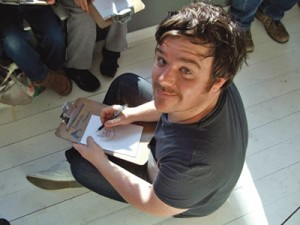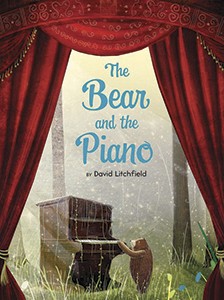2018 School Spending Survey Report
Publishers' Preview: Debut Authors: David Litchfield
This interview originally appeared in the July/August 2016 Horn Book Magazine as part of Publishers’ Previews: Debut Authors, an advertising supplement that allows participating publishers a chance to each highlight a first book.
This interview originally appeared in the July/August 2016 Horn Book Magazine as part of Publishers’ Previews: Debut Authors, an advertising supplement that allows participating publishers a chance to each highlight a first book. They choose the books; we ask the questions.
Sponsored by![]()
In David Litchfield’s The Bear and the Piano, a bear’s musical talent forces him into the classic conflict of any star: fame or family?
 Photo: Andrew Foster
Photo: Andrew Foster1. The note says the pictures were done in mixed media. What was in the mix?
DL: Lots of things! The drawings start with traditional media such as ink, pencil crayons, and paint. But I like to collect textures. I fill sketchbooks with watercolor washes and take close-up photos of tree bark (which gets me some strange looks in the park). I find crumbled, discolored paper and bits of old fabric. I scan all of these textures and drawings and combine them in Photoshop. It’s great fun figuring out what works best for each project.
2. If this isn’t too American a question, how do you get to Carnegie Hall?
DL: Like the bear, you’ve got to practice and practice and never give up. A lot of people try things and get frustrated that they haven’t mastered them instantly. Of course the first time you play the piano it’s going to sound horrible. You have to persevere, and eventually the music you make will sound beautiful.
 3. Why do you think bears are such popular picture-book protagonists?
3. Why do you think bears are such popular picture-book protagonists?DL: Bears have a comforting and protective quality to them in that they are strong and powerful animals. Yet there’s a vulnerability and clumsiness to them that is charming.
4. How will you handle picture-book fame? I mean, if it happens.
DL: Oh, I don’t know. Would I like to be a hero to people under the age of seven? I think that would be cool. If The Bear and the Piano is even a teeny-tiny part of someone’s childhood…I don’t think that I could ever feel more privileged.
5. Who is your “most important audience of all”?
DL: My son is nearly four years old, which is a helpful age for what I do. I run story ideas by him and show him my drawings, and his reactions help me move forward.
I used to want to be a rock star (ha!). But now my son is the only person I play guitar for. We sing “If You’re Happy and You Know It” and the Teenage Mutant Ninja Turtles theme. It’s the best thing ever. I wouldn’t swap that for rock stardom. Well, I don’t think I would.
Sponsored by![]()
RELATED
RECOMMENDED
ALREADY A SUBSCRIBER? LOG IN
We are currently offering this content for free. Sign up now to activate your personal profile, where you can save articles for future viewing.







Add Comment :-
Be the first reader to comment.
Comment Policy:
Comment should not be empty !!!